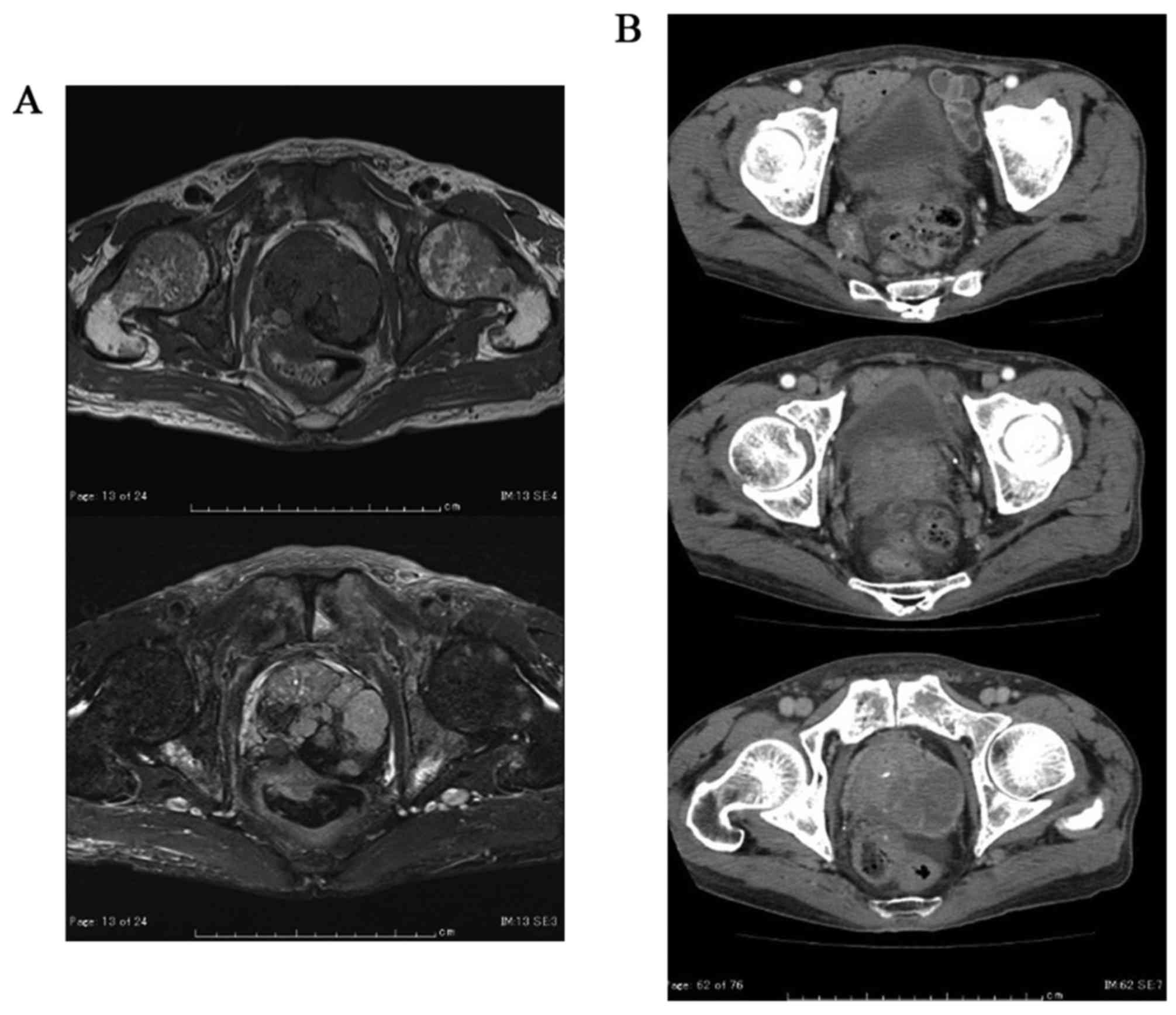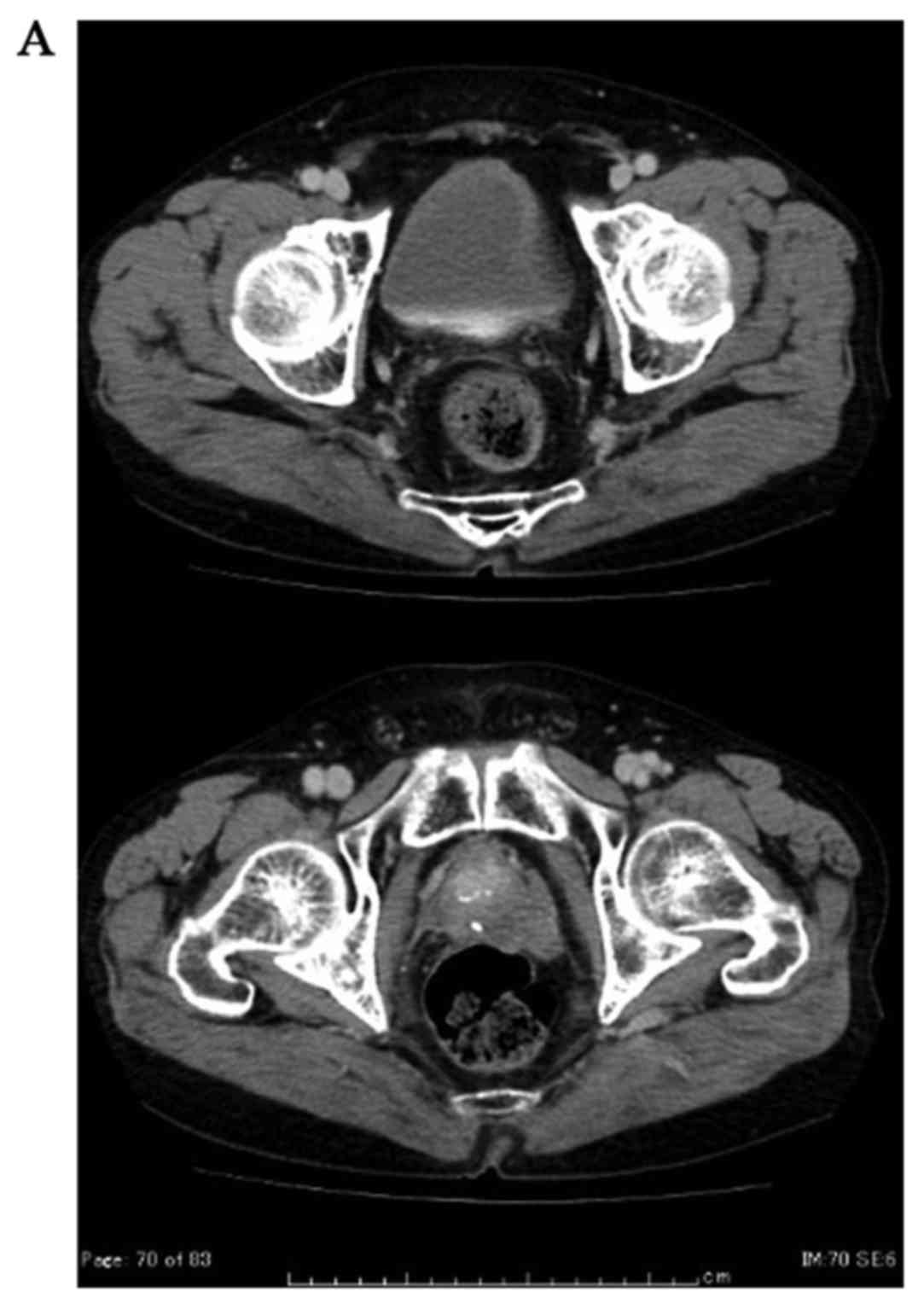|
1
|
Gauthier H, Bousquet G, Pouessel D and
Culine S: Abiraterone acetate withdrawal syndrome: Does it exist?
Case Rep Oncol. 5:385–387. 2012. View Article : Google Scholar : PubMed/NCBI
|
|
2
|
Witjes JA: A case of abiraterone acetate
withdrawal. Eur Urol. 64:517–518. 2013. View Article : Google Scholar : PubMed/NCBI
|
|
3
|
Albiges L, Auclin E, Rousseau B, Boughalem
E, Levy A, Loriot Y, Palma MD, Massard C and Fizazi K: Is there a
withdrawal syndrome with abiraterone acetate (AA)? J Clin Oncol.
31:892013. View Article : Google Scholar
|
|
4
|
Caffo O, Palermo A, Veccia A, Maines F,
Chierichetti F, Berruti A and Galligioni E: Biochemical and
objective response to abiraterone acetate withdrawal: Incidence and
clinical relevance of a new scenario for castration-resistant
prostate cancer. Urology. 82:1090–1093. 2013. View Article : Google Scholar : PubMed/NCBI
|
|
5
|
Caffo O, Maines F, Trentin C, Veccia A and
Galligioni E: Long-term outcomes and predictive factors in patients
(pts) with metastatic castration-resistant prostate cancer (mCRPC)
showing abiraterone withdrawal syndrome (AWS) after docetaxel (DOC)
treatment. J Clin Oncol. 34 2 Suppl:S3242016. View Article : Google Scholar
|
|
6
|
Lorente D, Mateo J, Zafeiriou Z, Smith AD,
Sandhu S, Ferraldeschi R and de Bono JS: Switching and withdrawing
hormonal agents for castration-resistant prostate cancer. Nat Rev
Urol. 12:37–47. 2015. View Article : Google Scholar : PubMed/NCBI
|
|
7
|
Paul R and Breul J: Anti-androgen
withdrawal syndrome associated with prostate cancer therapies:
Incidence and clinical significance. Drug Saf. 23:381–390. 2000.
View Article : Google Scholar : PubMed/NCBI
|
|
8
|
Taplin ME, Bubley GJ, Shuster TD, Frantz
ME, Spooner AE, Ogata GK, Keer HN and Balk SP: Mutation of the
androgen-receptor gene in metastatic androgen-independent prostate
cancer. N Engl J Med. 332:1393–1398. 1995. View Article : Google Scholar : PubMed/NCBI
|
|
9
|
de Bono JS, Logothetis CJ, Molina A,
Fizazi K, North S, Chu L, Chi KN, Jones RJ, Goodman OB Jr, Saad F,
et al: Abiraterone and increased survival in metastatic prostate
cancer. N Engl J Med. 364:1995–2005. 2011. View Article : Google Scholar : PubMed/NCBI
|
|
10
|
Azad AA and Eigl BJ: Evaluation of
prostate-specific antigen response following cessation of
abiraterone acetate: Is there evidence for a withdrawal syndrome?
Eur Urol. 65:504–505. 2014. View Article : Google Scholar : PubMed/NCBI
|
|
11
|
Taplin ME, Montgomery B, Logothetis CJ,
Bubley GJ, Richie JP, Dalkin BL, Sanda MG, Davis JW, Loda M, True
LD, et al: Intense androgen-deprivation therapy with abiraterone
acetate plus leuprolide acetate in patients with localized
high-risk prostate cancer: Results of a randomized phase II
neoadjuvant study. J Clin Oncol. 32:3705–3715. 2014. View Article : Google Scholar : PubMed/NCBI
|
|
12
|
Chen EJ, Sowalsky AG, Gao S, Cai C,
Voznesensky O, Schaefer R, Loda M, True LD, Ye H, Troncoso P, et
al: Abiraterone treatment in castration-resistant prostate cancer
selects for progesterone responsive mutant androgen receptors. Clin
Cancer Res. 21:1273–1280. 2015. View Article : Google Scholar : PubMed/NCBI
|
|
13
|
Richards J, Lim AC, Hay CW, Taylor AE,
Wingate A, Nowakowska K, Pezaro C, Carreira S, Goodall J, Arlt W,
et al: Interactions of abiraterone, eplerenone, and prednisolone
with wild-type and mutant androgen receptor: A rationale for
increasing abiraterone exposure or combining with MDV3100. Cancer
Res. 72:2176–2182. 2012. View Article : Google Scholar : PubMed/NCBI
|
|
14
|
Li Z, Bishop AC, Alyamani M, Garcia JA,
Dreicer R, Bunch D, Liu J, Upadhyay SK, Auchus RJ and Sharifi N:
Conversion of abiraterone to D4A drives anti-tumour activity in
prostate cancer. Nature. 523:347–351. 2015. View Article : Google Scholar : PubMed/NCBI
|
|
15
|
Li Z, Alyamani M, Li J, Rogacki K, Abazeed
M, Upadhyay SK, Balk SP, Taplin ME, Auchus RJ and Sharifi N:
Redirecting abiraterone metabolism to fine-tune prostate cancer
anti-androgen therapy. Nature. 533:547–551. 2016. View Article : Google Scholar : PubMed/NCBI
|
|
16
|
Caffo O and Sharifi N: Could steroidal
abiraterone metabolites possibly explain abiraterone withdrawal
syndrome? Eur Urol. 70:898–899. 2016. View Article : Google Scholar : PubMed/NCBI
|
|
17
|
Kitagawa Y, Ueno S, Izumi K, Mizokami A,
Hinotsu S, Akaza H and Namiki M: Nadir prostate-specific antigen
(PSA) level and tome to PSA nadir following primary androgen
deprivation therapy as independent prognostic factors in a Japanese
large-scale prospective cohort study (J-CaP). J Cancer Res Clin
Oncol. 140:673–679. 2014. View Article : Google Scholar : PubMed/NCBI
|

















